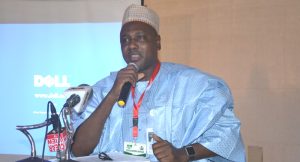The National Environmental Standards and Regulations Enforcement Agency (NESREA) and SRADEV-Nigeria have reiterated their commitment towards the elimination of Lead from paint in the country.

The stakeholders are also seeking safer alternatives to the use of lead in paints.
The stakeholders stated this at the regional Lead awareness workshop on Thursday, April 4, 2024, in Abuja.
The workshop was organised by NESREA in collaboration with SRADEV-Nigeria as part of the Lead Exposure Elimination Project.
The theme of the workshop is: “Strengthening national capacity towards elimination of Lead paint in Nigeria”.
The Director-General of NESREA, Prof. Aliyu Jauro, said that Lead is a highly toxic substance that poses severe health risks, especially to children.
He said that exposure to Lead could result in irreversible neurological damage, developmental disorders, and a host of other health complications.
Jauro said that the primary purpose of the workshop was to raise awareness on the dangers of leaded paints, safer alternatives and reformulation methods for SMEs across the country.
“Our mandate encompasses a wide range of activities, including the regulation of chemicals, waste, pollution control, and environmental impact assessment, among others.
“Today, we gathered here to address a pressing issue that directly affects the health and well-being of everybody, the elimination of lead paint,” he said.
He said NESREA had recently reviewed and gazetted the National Environmental (Chemicals and Pesticides) Regulations 2023.
“These regulations take into account emerging environmental concerns, including the presence of lead in paint.
“By doing so, we aim to strengthen the legal framework governing the production, importation, distribution, and use of paint in Nigeria,” he said.
“It is crucial to acknowledge that eliminating Lead from paint is not only possible but also imperative for a healthier and more sustainable future,” he said.
“NESREA and SRADEV Nigeria Lead Exposure Elimination Project, is fully committed to supporting all participants in this workshop in their journey towards achieving this goal,” he said.
In a presentation, Spanny Embiemu, Head, Food and Chemicals, NESREA, said that lead could enter the human body through uptake of food (65 per cent) water, (20 per cent) and air (15 per cent).
She said that the common exposure of lead -in -paint in children was through paint dust.
“Lead fulfills no essential function in the human body, it can merely do harm after uptake from food, air or water.
She said that Lead could cause several unwanted effects, such as rise in temperature, kidney damage, miscarriages, among others.
Embiemu said that the alternative to the use of lead in paint included Zirconium, metallic zinc, cobalt, metallic calcium among others.
She said that cleaner alternatives like Titanium dioxide have also been known to be in use.
He said that NESREA would continue to create awareness to relevant stakeholders on the dangers of leaded paints for maximum impact.
Lead and lead compounds have been used in a wide variety of products found in and around homes, including paint, ceramics, pipes and plumbing materials, solders, gasoline, batteries, ammunition and cosmetics.
By Doris Esa
